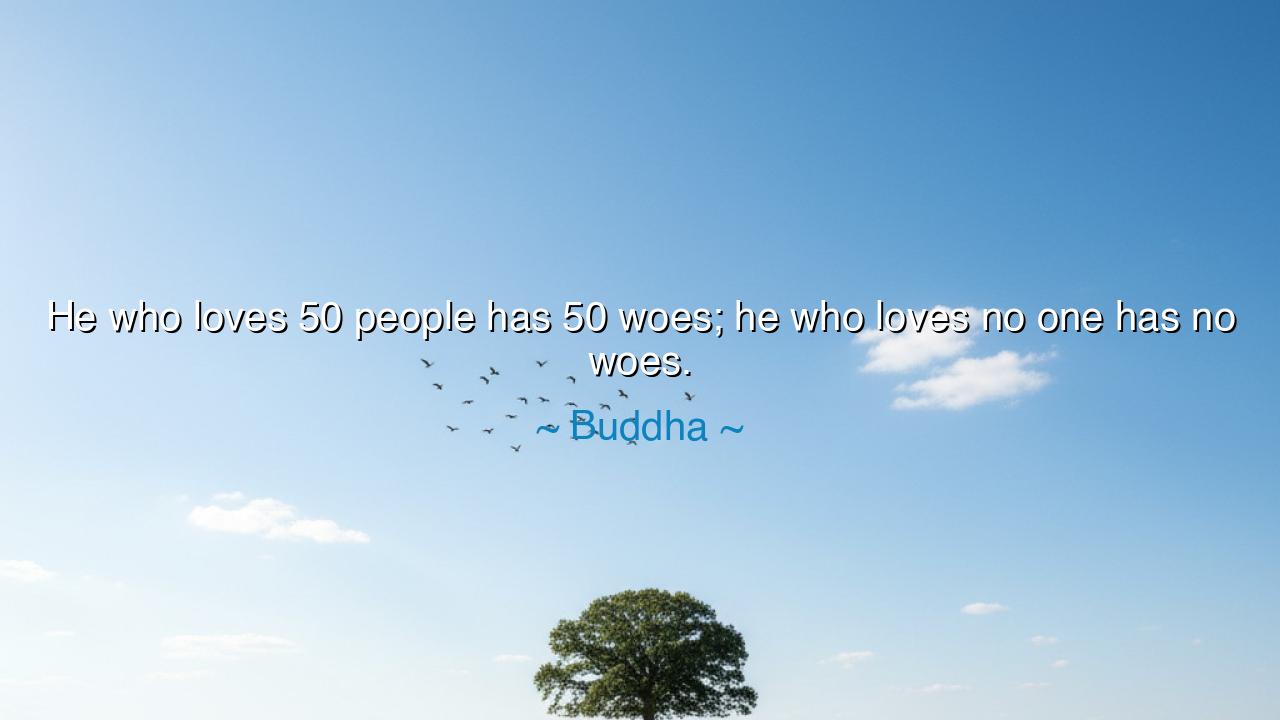
He who loves 50 people has 50 woes; he who loves no one has no






Listen, O seekers of the path, to the timeless words of Buddha, who cast his gaze upon the heart of human experience: "He who loves 50 people has 50 woes; he who loves no one has no woes." In this utterance lies the ancient recognition of the inescapable intertwining of love and suffering, the law that those who open their hearts to the world invite both joy and sorrow in equal measure. The teaching is not of bitterness, but of awareness—a guide to navigate the vast seas of attachment and compassion.
In the theater of life, to love is to risk, to expose one’s spirit to the currents of fate and the frailty of others. Each affection, each bond, carries the potential for pain, for disappointment, for longing unmet. Buddha, the sage of insight, observes with clarity that human connection is a double-edged sword: the more one gives of the heart, the greater the tally of woes. Yet these woes are not curses—they are the natural price of tenderness, the echoes of a soul fully engaged in the world.
Yet, observe the paradox, O children of reflection: to love none is to shield oneself from sorrow, but also from the luminous beauty of intimacy. The heart that closes its gates may walk unharmed through the storms of loss, but it also walks alone through the gardens of delight. Buddha’s words illuminate the delicate balance between desire and detachment, between joy and vigilance, reminding us that human experience is measured not by safety, but by the depth of feeling one dares to embrace.
The ancients spoke of this as the law of impermanence: all connections wax and wane, all bonds bear the weight of change. In loving, one acknowledges the fragility of life, the transience of being, and the inevitability of suffering. Yet it is precisely through this embrace of vulnerability that the soul is tested and refined, learning wisdom, patience, and the true measure of compassion.
Thus, O seekers of understanding, let this teaching lodge within your hearts: the woes of love are not curses, but the mirrors of life’s fullness. To enter into relationship with courage, to give one’s heart despite the tally of possible griefs, is to honor the profound gift of human connection. In the awareness of both joy and sorrow, one walks the noble path, attuned to the eternal rhythm of love, loss, and awakening.






HDHai Hung Dang
This quote from Buddha seems to speak to the burdens of emotional investment. Loving many people can lead to worry and pain, but can it also lead to personal growth and stronger bonds? Is it worth embracing the woes that come with love, or does Buddha’s wisdom suggest that we should seek peace through emotional distance? How do we find the balance between connection and self-preservation?
QTQuan Tran
Buddha’s quote seems to advocate for emotional detachment as a way to avoid suffering, but isn’t there a danger in not loving anyone at all? Perhaps the key is not in how many people we love, but in how we manage our attachments and expectations. Can we love without attachment? Is it possible to experience the beauty of love without being weighed down by its challenges?
PPTT
It’s interesting to think about love as something that brings both joy and woes. Loving many people can indeed be exhausting, but doesn’t it also open up opportunities for growth, learning, and shared happiness? Can we really live a fulfilling life without loving others? Maybe the challenge isn’t in the number of people we love, but in how we manage the emotional complexities that arise from it.
DANguyen Duy Anh
Buddha's quote presents a dilemma: should we limit how much we love in order to avoid pain? Or is it that the capacity for love naturally comes with a price? I wonder, though—does loving no one really eliminate woes, or does it simply create a different form of emptiness or loneliness? Could this quote be about the balance between connection and emotional independence?
KLTong khanh Linh
This quote suggests a trade-off between love and peace of mind. While loving many can lead to heartache and worry, isn’t there a richness in these relationships that outweighs the woes? Does Buddha mean to suggest that emotional detachment leads to freedom from suffering, or is he emphasizing the importance of balancing love with inner peace? Can we love deeply without suffering from it?